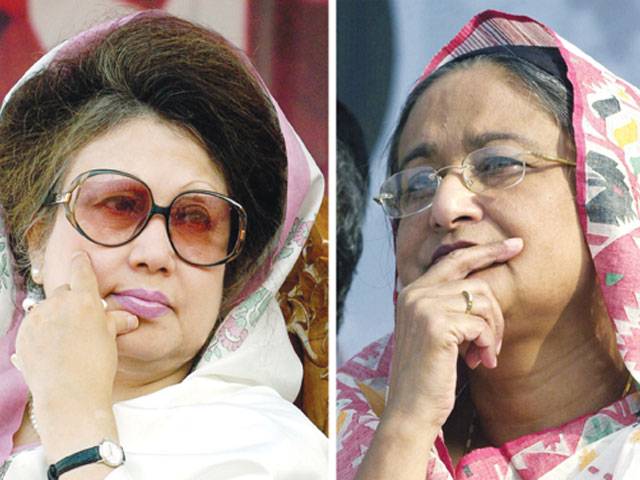Shafiqul ALAM
When they joined forces two decades ago, Bangladesh’s “Battling Begums” ousted a dictator and ushered in a new era of democracy.
But now the toxic rivalry between Prime Minister Sheikh Hasina and opposition leader Khaleda Zia is threatening to bring the country to the brink once more.
As Bangladesh goes to the polls on Sunday, Hasina is guaranteed to be re-elected in what is effectively a one-party contest. But while voters prepare to cast their ballot, Zia is under de facto house arrest after her party decided to boycott an election it says would be rigged. Until this week, there had been hopes the two women would be able to put aside their differences and come to some kind of compromise after the deadliest year of political violence in Bangladesh’s short history.
But mediation efforts failed to persuade either woman to back down and analysts say the situation is only likely to worsen.
“Sunday’s election is a warm-up match before a more deadly battle between the Begums. It could bring the country to the brink,” said Ataur Rahman, a Dhaka-based political analyst. “Begum” is an honorific used for respected Muslim women. Ever since the elections were called in October, Zia has been demanding that Hasina stand aside and let a neutral caretaker government organise the contest.
But Hasina has refused to bend and accused Zia of holding the country hostage after her Bangladesh Nationalist Party organised a series of blockades. The extent of their enmity was laid bare in October when transcripts were leaked of their first phone conversation in 15 years.
Slanging match
After some initial pleasantries, the conversation soon developed into a mutual slanging match with Hasina accusing Zia of attempting to kill her.
The premier even accused Zia of falsifying her birth certificate so she could celebrate her birthday on the anniversary of the 1975 assassination of Hasina’s father Sheikh Mujibur Rahman.“Why did you cut cake on August 15?” Hasina, 66, asked. “Can’t anyone be born on that day?” the 69-year-old Zia responded.
An invitation to dinner at the prime minister’s residence was turned down by Zia. The ramifications of their mutual dislike was seen in January 2007 when their failure to agree on an electoral framework prompted the military to step in, impose emergency rule and set up a caretaker government.
Both women were jailed for a year on corruption charges before later striking deals that allowed them to take part in a December 2008 election which Hasina won by a landslide.
Early yars
In the early years of their political life, the two women worked together, combining to help topple another military regime in 1990. But the allies become rivals in elections the following year, trading often personal insults at rallies.
Hasina first came to power in 1996 after she led mass protests against Zia’s re-election in a contest that was riddled with irregularities.
Zia was forced to stand aside only 43 days after being declared the winner, reluctantly agreeing to a re-run organised by a neutral caretaker administration - Zia’s demand of Hasina this time round.
After Hasina’s first premiership was blighted by corruption allegations, Zia then bounced back and defeated her nemesis in a 2001 election.
Relations hit their nadir in August 2004 when Hasina survived an assassination attempt at a rally where 20 of her supporters were killed in a grenade attack. Having suffered permanent damage to her hearing, Hasina has consistently maintained the attack was orchestrated by Zia’s son.
Despite their mutual accusations of power-grabbing, both women were initially reluctant politicians and were catapulted into the limelight by tragedy.
Zia was a 35-year-old housewife and mother of two young sons when her husband, general-turned-president Ziaur Rahman was killed in an attempted coup in 1981. Hasina took on the mantle as leader of the Awami League after her father, Sheikh Mujibur Rahman, was gunned down by renegade army officers in 1975.
The future premier also lost a mother and three brothers in the massacre at their family home. Hasina was in Germany at the time but later returned to take the Awami League, while she was also aged in her early 30s.
Despite being accorded the respectful honorific “begum”, many observers say the pair deserves opprobrium rather than respect for poisoning the political climate. “Now is the time that both the leaders in question should stop and look for an honourable exit,” said an editorial in Saturday’s Daily Star. “Enough is enough.”–AFP
Saturday, April 20, 2024
‘Battling Begums’ bring Bangladesh to brink

8:27 AM | April 19, 2024
8:09 AM | April 19, 2024
Pak economy improving, funds will be provided on request: IMF
9:57 PM | April 19, 2024
Minister advocates for IT growth with public-private collaboration
9:57 PM | April 19, 2024
Judges' letter: IHC seeks suggestions from all judges
9:55 PM | April 19, 2024
Formula 1 returns to China for Round 5
9:05 PM | April 19, 2024
Germany head coach Julian Nagelsmann extends contract till 2026 World Cup
9:00 PM | April 19, 2024
A Tense Neighbourhood
April 19, 2024
Dubai Underwater
April 19, 2024
X Debate Continues
April 19, 2024
Hepatitis Challenge
April 18, 2024
IMF Predictions
April 18, 2024
Kite tragedy
April 19, 2024
Discipline dilemma
April 19, 2024
Urgent plea
April 19, 2024
Justice denied
April 18, 2024
AI dilemmas unveiled
April 18, 2024
ePaper - Nawaiwaqt
Advertisement
Nawaiwaqt Group | Copyright © 2024





